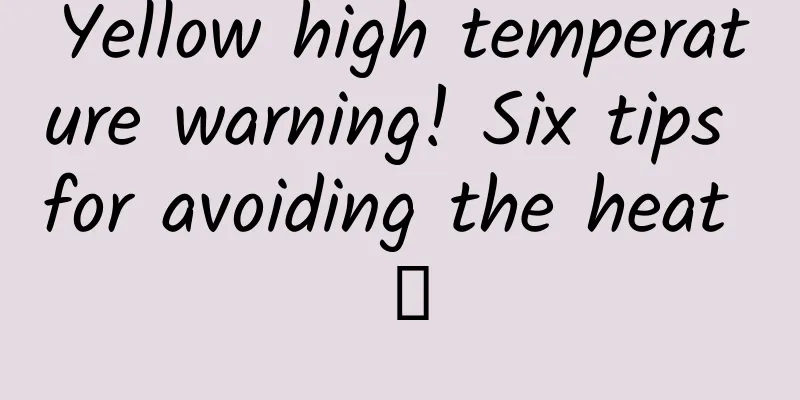Yellow high temperature warning! Six tips for avoiding the heat →

|
Audit expert: Peng Guoqiu Deputy Chief Physician, Fourth Medical Center, PLA General Hospital Beijing has been experiencing high temperatures in recent days. According to @天气北京, from June 25 to 28, the highest temperature in the plain area will be above 35°C from 12:00 to 16:00 every day. Beijing has issued a yellow high temperature warning signal! Image source: Beijing Meteorological Bureau The hot summer is unbearable. According to relevant research, cardiovascular and cerebrovascular diseases enter a high incidence period starting from June every summer and will last until mid-August. According to previous statistics, for every 1°C increase in the maximum temperature, the number of emergency cardiovascular and cerebrovascular disease patients will increase by 17.3%. In the face of continued high temperatures, what behaviors should we avoid? How can we prevent heat stroke scientifically and spend this summer safely? We have answers for you one by one! 6 things to avoid in summer In summer, the hot weather makes people seek various ways to cool down. However, some common ways to cool down may not be good for the body: 01 Be careful when eating overnight dishes In the hot summer, bacteria in food multiply faster. If leftover food is not properly refrigerated or sealed, bacteria will multiply and cause food to spoil. Eating leftover food may cause digestive system symptoms such as abdominal pain, diarrhea, and vomiting, or even food poisoning, which can have a serious impact on your health. Therefore, you should try to avoid eating leftover food in the summer to ensure food safety. 02 Don't drink too much water at one time When we take in a lot of water at once, the blood is diluted, resulting in a relative decrease in the sodium content in the blood, a condition known as hyponatremia. Hyponatremia may cause a range of health problems, such as headaches, vomiting, brain swelling, and even possible brain damage. In addition, drinking too much water can also increase the burden on the heart, as the body needs to process the extra water, which may lead to impaired heart function and symptoms such as chest tightness and shortness of breath. Therefore, the correct way to drink water is to drink small amounts and multiple times. It is recommended to control the amount of water you drink to about 200-300 ml each time, and distribute the amount of water evenly throughout the day. When doing strenuous exercise or being exposed to high temperatures for a long time, you can increase the frequency and amount of drinking water appropriately, but you still need to avoid drinking too much water at one time. 03 Avoid cold showers When the human body is in a high temperature environment, the pores will naturally open to dissipate heat. If you suddenly rinse with cold water at this time, the pores will shrink rapidly, preventing the normal dissipation of body heat. The sudden stimulation of cold water may also cause the blood vessels to shrink sharply, leading to increased blood pressure. For people with cardiovascular diseases, this practice may even induce serious consequences such as acute myocardial infarction. Therefore, it is recommended to choose warm water bathing in summer, which can not only clean the skin, but also promote blood circulation, help eliminate fatigue, and improve sleep quality. 04 It is not advisable to sleep in an air-conditioned room all night. Many people like to sleep with the air conditioner on all night in the summer, but if you stay in the air-conditioned environment for a long time, especially when the temperature difference between indoor and outdoor is too large, the pores of the human body will close, affecting the normal dissipation of heat in the body. This may not only cause the body to catch a cold, but also cause insufficient blood supply to the brain due to the rapid contraction of blood vessels in the brain. For people with a history of hypertension and cardiovascular disease, this situation is more dangerous and may induce serious health problems such as "heat stroke". At the same time, using the air conditioner with doors and windows closed for a long time will also make the indoor air turbid. Therefore, it is recommended to reasonably control the temperature and time of the air conditioner to keep the temperature difference between indoor and outdoor not too large. 05 Don't expose your skin under the scorching sun In the summer, the sun is strong, and some outdoor workers may choose to take off their shirts to work in order to keep cool. However, if they are exposed to ultraviolet rays for a long time, it may cause sunburn, pain and peeling of the skin at the least, or it may cause skin inflammation and even increase the risk of skin cancer. More seriously, long-term strong sun exposure may also cause edema and may even lead to kidney and other related diseases. Therefore, outdoor activities should be avoided as much as possible in hot weather, especially from 10 am to 2 pm when the sun is strongest. If you must go out to work, you should also take sun protection measures and take regular breaks. 06 Don't over-rely on cold drinks Although cold drinks can bring a brief sense of coolness in the summer, long-term and large-scale drinking can have adverse effects on the stomach and intestines. Cold drinks may interfere with gastrointestinal motility, lead to digestive disorders, and even cause abdominal pain and other problems. For patients with coronary heart disease and hypertension, cold drinks may also cause vasoconstriction and aggravate the condition. How to prevent and treat heat stroke and heat stroke? If you accidentally get heat stroke or even heat stroke, what should you do? Image source: Beijing Meteorological Bureau Heat stroke refers to an acute disease with central nervous system and/or cardiovascular dysfunction as the main manifestation, which occurs in an environment with high temperature or humidity and no ventilation, due to dysfunction of the body temperature regulation center or failure of sweat gland function, as well as excessive loss of water and electrolytes. Heat stroke is a type of severe heatstroke. It is a fatal disease with a high mortality rate. It is caused by the dysfunction of the body's temperature regulation function due to high temperature and excessive accumulation of heat in the body, which leads to damage to the nervous organs, high fever and impaired consciousness. The main symptoms of heat stroke: 01 Premonition of heat stroke: After working in a high temperature and high humidity environment for a certain period of time, symptoms such as dizziness, headache, fatigue, thirst, sweating, palpitations, inattention, and uncoordinated movements may occur; the body temperature is normal or slightly elevated but not exceeding 38.0 ℃. 02 Mild heat stroke: Symptoms of heat stroke include one of the following: rapid and weak pulse, pale complexion, low blood pressure, peripheral circulatory failure, and body temperature above 38°C. 03 Severe heat stroke: Syncope, coma, high fever, body temperature above 41°C, severe cases may experience heat stroke, sunstroke, heat cramps, and heat exhaustion. 04Heat stroke: The main manifestations are high fever (oral body temperature above 39.5℃), no sweat, and coma. In the early stage of the disease, there is a lot of cold sweat, followed by no sweat, shallow and rapid breathing, rapid pulse, decreased blood pressure, restlessness, confusion, and convulsions in the limbs. Emergency treatment: 1. Get out of the hot and humid environment, quickly transfer the patient to a ventilated place, lie flat on the spot, unbutton clothes to facilitate breathing and heat dissipation, and rest in a cool place. 2. Cooling treatment: quickly take measures to cool the body surface, such as ice compress, cold water wipe, cold water bath, etc. Drinking a lot of water will affect the digestive function, so you should drink a small amount of water multiple times, and each time should not exceed 300 ml. Cool down to below 38 degrees Celsius as soon as possible. 3. Assess the person’s state of consciousness. If there is no response and the person has stopped breathing or heartbeat, call 120 for help. Trained personnel can perform cardiopulmonary resuscitation immediately. 4. Severe heatstroke patients must be sent to hospital for diagnosis and treatment immediately. When transporting patients, they should be transported on a stretcher. At the same time, attention should be paid to applying ice packs to the patient's neck, armpits and thigh roots as much as possible during transportation, and actively perform physical cooling to protect important organs such as the brain, heart and lungs. |
<<: Academicians teach you how to choose a major | Do you want to be a "chief engineer"?
>>: How to accept the hurt emotions of children? "Useless" love is more powerful
Recommend
After Yangkang, will exercise lead to sudden death from myocarditis? How long can I exercise?
Can I resume exercise immediately after “Yang Kan...
Today is the Great Cold丨We snuggle together beside the warm stove in winter and look forward to the return of spring with you!
"The sky and river are clearing away the nig...
User operation, how to achieve a breakthrough from 0 to 1?
Users, as one of the most important factors in pr...
World Handwashing Day | Attention! 6 common misunderstandings about hand washing, be careful of "the more you wash, the dirtier it gets"!
Today is World Handwashing Day . Some people may ...
The entry threshold for new energy vehicles has been raised, requiring companies to earn "patient money"
Recently, the "Automotive Industry Investmen...
How to promote and attract traffic to Jiayuguan Mini Program? How to promote and attract traffic to Jiayuguan Mini Program?
Recently, many customers have asked me what to do ...
A new breakthrough in transparent materials! The "black technology" of supramolecular glass
Produced by: Science Popularization China Author:...
Reverse product thinking: What is the logic of "use it and leave it"?
I think "use it and go" should be a rev...
Google: 2020 Smart Digital City Report - Citywide AI (136 pages)
Google Hong Kong today released the first edition...
There is no best copywriting, only the most suitable copywriting at the moment. There is no need to always write it to 100 points!
Regarding copywriting , the author has always held...
When a person is crying, he starts to "twitch", not because of fear but because of "poisoning"
When we were young, we might be beaten by our par...
To be a human being, you should be like a capybara...
Capybara, the new spiritual totem of contemporary...
How are transmission lines mounted on tall towers?
The towering iron towers and silver wires span mo...
Qingyang Mini Program Investment Company, how much does the Flower Mini Program cost?
How much is the investment price in Qingyang Flow...









